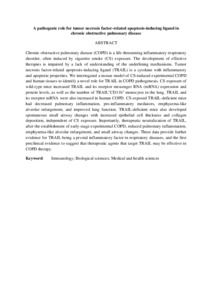Citation
Haw, T. J. and Starkey, M. R. and Nair, P. M. and Pavlidis, S. and Liu, G. and Nguyen, D. H. and Hsu, A. C. and Hanish, I. and Kim, R. Y. and Collison, A. M. and Inman, M. D. and Wark, P. A. and Foster, P. S. and Knight, D. A. and Mattes, J. and Yagita, H. and Adcock, I. M. and Horvat, J. C. and Hansbro, P. M.
(2016)
A pathogenic role for tumor necrosis factor-related apoptosis-inducing ligand in chronic obstructive pulmonary disease.
Mucosal Immunology, 9 (4).
pp. 859-872.
ISSN 1933-0219; ESSN: 1935-3456
Abstract
Chronic obstructive pulmonary disease (COPD) is a life-threatening inflammatory respiratory disorder, often induced by cigarette smoke (CS) exposure. The development of effective therapies is impaired by a lack of understanding of the underlining mechanisms. Tumor necrosis factor-related apoptosis-inducing ligand (TRAIL) is a cytokine with inflammatory and apoptotic properties. We interrogated a mouse model of CS-induced experimental COPD and human tissues to identify a novel role for TRAIL in COPD pathogenesis. CS exposure of wild-type mice increased TRAIL and its receptor messenger RNA (mRNA) expression and protein levels, as well as the number of TRAIL+CD11b+ monocytes in the lung. TRAIL and its receptor mRNA were also increased in human COPD. CS-exposed TRAIL-deficient mice had decreased pulmonary inflammation, pro-inflammatory mediators, emphysema-like alveolar enlargement, and improved lung function. TRAIL-deficient mice also developed spontaneous small airway changes with increased epithelial cell thickness and collagen deposition, independent of CS exposure. Importantly, therapeutic neutralization of TRAIL, after the establishment of early-stage experimental COPD, reduced pulmonary inflammation, emphysema-like alveolar enlargement, and small airway changes. These data provide further evidence for TRAIL being a pivotal inflammatory factor in respiratory diseases, and the first preclinical evidence to suggest that therapeutic agents that target TRAIL may be effective in COPD therapy.
Download File
![[img]](http://psasir.upm.edu.my/54892/1.hassmallThumbnailVersion/A%20pathogenic%20role%20for%20tumor%20necrosis%20factor-related%20apoptosis-inducing%20ligand%20in%20.pdf)  Preview |
|
Text (Abstract)
A pathogenic role for tumor necrosis factor-related apoptosis-inducing ligand in .pdf
Download (7kB)
| Preview
|
|
Additional Metadata
Actions (login required)
 |
View Item |

